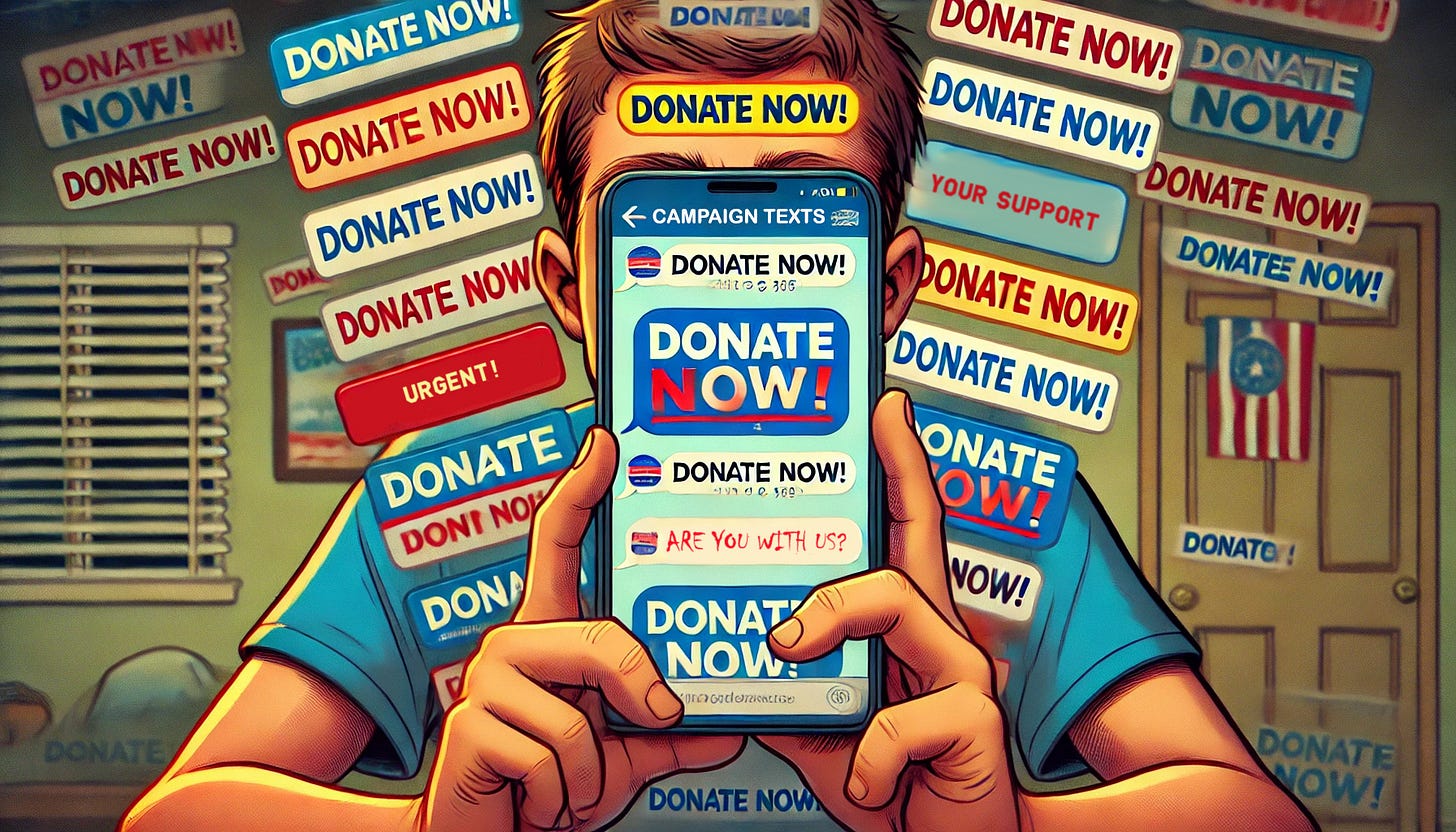PPPPolls Are Now Open (Four Ps #248)
Hopefulness, Selfishness & Truthiness on Election Day. Also: Profits, Stupidity, & Grief.
🗳️ Election Day is here!
And at the end of the day (or whenever the votes have been certified), here's what we know:
1/3 of Americans will be thrilled
1/3 will be upset
The final 1/3? They won't even notice.
For me, the real win? The end of endless emails, texts, calls, and door-knocks from candidates and their proxies... finally winding down. Probably. Maybe?
🤔 But what will the impact be when all is said and done?
It isn’t just about who’s on the ballot this year. No matter who wins or loses, this broken process digs a bigger, deeper hole in our democracy every time.
Unless...
THE PERSONAL: Passing Down the Power
📢 My biggest takeaway from this election cycle?
We need to prioritize raising a generation that will vote in every election, every time, no matter what.
Today, young voters could be the ones to swing this election in a big way. In a nation as divided as ours, their voices could bring clarity to the close calls, shifting outcomes on issues that impact us all—from climate policy to healthcare to human rights.
But they have to show up.
For those of us who’ve been voting since the days of lining up with a paper ballot, it’s tempting to think, "Are the young ones even that interested?"
📊 Look at the data—it shows they are. Early voting numbers among younger voters have been strong this year, with many first-time voters joining the mix. So, how do we keep that momentum going beyond this election? Attention vs connection... audience or community. Does it even matter?
💡 It starts with us.
Here are a few ways we can raise conscientious voters and show them the power they hold with every election::
Make Voting the Norm: When kids see you prioritize voting in every local, state, and national election, they’ll understand it’s a responsibility, not an afterthought. Talk about it, plan for it, celebrate it.
Explain the Stakes, Big and Small: Younger voters care deeply about certain issues—climate, equality, human rights. Show them that voting in every election helps protect these values over the long haul. Let them see that those small, local elections matter just as much as the big ones.
Teach Critical Thinking: This generation has no shortage of information at their fingertips, but not all of it is true. Encourage them to dig into issues, ask questions, and understand where each candidate stands on what matters to them. That’s how you raise an informed voter.
The stakes have always been high. But young voters today face issues that have long-term consequences—economics, reproductive rights, a warming planet.
And if we want to see these kids grow into adults who vote every time, we need to instill that in them now.
Let’s give them more than history lessons. Give them encouragement, teach them the ins and outs of researching candidates, and remind them their voice matters.
The next generation’s voting habits start with us.
So as the results roll in tonight, think about what we’re passing down. After all, the future of the ballot box isn’t just about today—it’s about every election day after that.
THE PROFESSIONAL: The Rise—and Cost—of Political Advertising
I've been studying the role and impact of advertising and communications on presidential elections since 1997. 🔍
It was my undergraduate major, and while I haven’t directly worked on political advertising professionally, I’ve remained very close to it.
Political ads have been around for generations—from print to radio to television to web to email to text to social to the metaverse. Political ad spend keeps increasing, but today, it’s more relentless and powerful than ever before.
💸 What’s the cost of this hyper-charged, nearly omnipresent messaging? And who’s paying it?
Just this year, political advertisers have poured $619 million into Google and Meta platforms alone. By the time Election Day ends and votes are counted (and re-counted?), U.S. ad spending across all media could hit $14 billion—a nearly 35% increase over 2020.
📊 Traditional media still claims the lion’s share, but digital spending is skyrocketing, doubling its slice since the last presidential cycle. The ad landscape has changed dramatically:
Connected TV (CTV): CTV ad spending is up over 500% since 2020, allowing ads to reach households across the country at all hours.
Social Media: Despite platform restrictions, social ad spending has increased 86%, reaching a projected $605 million this year.
Political ads aren't just a line item in a campaign budget. It’s become a massive, relentless operation designed to keep candidates, issues, and controversies in front of voters every day. Those texts and emails we keep getting 100x a day? That's just the beginning.
But that constant exposure doesn’t come without consequences:
Amplified Misinformation -- With generative AI producing an unprecedented amount of fake content, political ads on platforms like Google and Meta can easily blur fact and fiction. Campaigns have the power to create polished, shareable content that can spread misinformation at lightning speed, making it harder for voters to find accurate information.
Increased Polarization -- Today’s ads are engineered for engagement. That means they’re often more sensational, more divisive, and more personal. Aiming to provoke strong emotions—anger, fear, outrage—these ads deepen divisions and push voters further to the extremes.
Erosion of Trust -- With billions in spending, campaigns are willing to go to extreme lengths to get attention, from attack ads to subtly manipulative messaging. Over time, these tactics erode public trust in politics, making voters more cynical and disengaged.
💰 So who actually benefits from this spending surge? Certainly not the American electorate. Platforms like Meta, Google, and now CTV providers like YouTube, are raking in massive profits from political ads—projected to hit nearly $12 billion in digital by year’s end.
But here’s the kicker: while tech giants cash in, the American public pays the price in another currency—truth and trust.
🗳️ Is all this spending even effective? Evidence suggests it is. But effective at what? Influencing votes, sure. Strengthening democracy? Who knows?
As traditional media holds steady, digital platforms are becoming the leading battleground for political influence. But with AI-driven deepfakes, echo chambers, and increasingly aggressive data targeting, the real question becomes not just how much will be spent, but how much we can endure before the very foundation of democratic engagement is shaken.
🔍 As political ad spending sets records, let’s take stock of its costs. The future of political engagement may look sleek and digital, but it risks becoming manipulative, divisive, and ever more disconnected from real issues.
In the end, we may have to ask ourselves: what are we willing to sacrifice in the name of influence?
THE POLITICAL: Stupidity, Selfishness, or Both?
There are lies you choose to believe, and lies you choose to ignore. 🌀
This means that those who support Donald Trump at this point are either misled, selfish, or both.This isn’t an ad hominem attack; it’s the truth.
So, how has it come to this?
As my wife pointed out with almost numb disbelief, Donald Trump is back on the ballot—for the third time. His nomination forces us to confront a stark reality: the Republican Party isn’t who they say they are.
📜 For the past 50 years, Republicans have championed values like character, personal accountability, fiscal responsibility, and support for immigrants. But that narrative? It’s been a lie—or, more accurately, a giant lie made up of millions of smaller lies.
Back in 2000, I contributed to a book on the Gore-Bush election. Even then, the Republican Party’s identity was shifting beneath the surface. But today, the gap between what Republicans claim to stand for and what they’ve actually built is vast—unrecognizable compared to what it was 24 years ago.
🔍 This isn’t just about Trump’s brand of politics; it’s about decades of contradictions within the GOP finally coming to a head, exposing the party’s true priorities.
1. Racism Was Never an Outlier.
Trump’s divisive rhetoric (see: MSG rally) might seem like an outlier, but his tactics actually follow a well-worn Republican path.
Ronald Reagan used “states’ rights” to signal resistance to integration, especially in the Deep South. Nixon’s “Southern Strategy” targeted white voters anxious about civil rights gains.
Trump stokes the same fears in a modern guise—making thinly veiled appeals to white nationalism (or praising Hitler's generals) seem almost mainstream in GOP politics.
2. A Party of White Grievance.
The GOP hasn’t always ignored Black voters. In fact, in 1964, over 40% of Black voters leaned Republican. But today, a dwindling 3% of African-Americans identify with the party. Why?
Rather than broaden their appeal, Republicans doubled down on their white base.
Under Trump, the GOP solidified its reputation as a “party of white grievance,” pushing policies that disproportionately impact people of color—like restrictive voter ID laws and opposition to automatic voter registration.
3. “Family Values” Were a Convenient Myth.
Trump may have shattered the GOP’s family values image, but that image was on shaky ground long before:
The party that decries infidelity and champions conservative Christianity has chosen to look the other way with Trump, whose personal scandals run deep.
For years, “family values” were a convenient mask, used as a political weapon rather than a sincere commitment.
4. Fiscal Responsibility? Ummm, Not Really.
Fiscal conservatism was once a bedrock of Republican philosophy, but Trump’s record exposes it as yet another illusion:
Under Trump from 2017-2020, the national deficit soared to record highs, with $2 trillion added in two years.
Despite claims of budget discipline, the GOP used fiscal responsibility as a hammer to wield against Democrats while failing to rein in its own spending.
5. The Party That Feeds on Fear.
America is changing—demographically, culturally, socially—and the Republican Party has weaponized that change:
Immigration, diversity, and shifting power dynamics are cast as threats to American values.
Trump’s refrain about dog-eating criminals echo his calls for walls and travel bans that tap into these anxieties, and few Republican leaders have pushed back.
By throwing their support behind Trump, Republicans have revealed their true colors. They're bad people who only care about themselves. Their allegiance to principles like family values, fiscal restraint, and accountability has fallen away, leaving only the pursuit of power.
The cost of this will be written in the history books. And for the GOP, that legacy will endure longer than Trump’s campaign signs, which I don't expect his supporters to clean up on the side of the roads anytime soon.
THE PRACTICAL: Your Post-Election Grief
Two of my favorite questions to ask as a boss or manager are: "So What?" and "Now What?"❓ ❓ ❓
For now, let’s skip the first and dive into the second.
🔄 No matter what happens in this election, we can't afford to rest on any one outcome or decision.
But what if the worst-case scenario actually does happen? How will you and I handle a closely contested loss?
The twists of history can stir surprisingly deep, personal emotions—feelings often reserved for profound loss. For many, election outcomes evoke grief, ranging from disbelief to hopelessness, especially when hopes for the future seem to veer off course.
🌧️ In 2016, when the election results came in, I felt an unexpected wave of grief, akin to what one experiences after a profound loss. I’m pretty sure I cried. I felt a deep sense of loss and hopelessness.
A few months later, A few months later, a friend recommended I read a new book, It’s OK That You’re Not OK, by Megan Davine.
Comparing the results of a presidential election to the death of a family member may seem extreme, yet the feelings of grief were real. When what we saw as a shared vision feels disrupted, it can feel like part of our foundation has crumbled.
Books like Devine’s remind us that grief isn’t linear. There’s no set timeline or “right” way to grieve. If this election doesn’t go as you hoped, allow yourself to feel disappointment, worry, and sadness without guilt. Accepting grief as part of the process can help us stay connected to our values and find meaning.
This time around, if grief does surface, be proactive in managing it. Reading, meditating, talking to friends, or seeking support can make a world of difference. It’s not about letting one outcome define us, but about processing our reactions, staying grounded, and finding resilience together.
So here’s how you can manage the impact of grief, inspired by insights from It’s OK That You’re Not OK by Megan Devine:
Accept Your Grief as a Natural Response: When we experience a loss, whether it’s a person, a relationship, or even a political outcome, our grief is valid. It’s tempting to downplay it or listen to those who offer well-meaning, but empty, reassurances. Grief isn’t something to rush or “fix.” It’s a journey to integrate into our lives. Allow yourself to feel it fully without judgment.
Set Boundaries Around Your Grief: If you’re not ready to discuss the election with family or friends, it's OK to step back. Say no to gatherings or conversations if they add more stress than support. Lean into moments of solitude if you need them, and be intentional about who you let into your space. Everyone processes loss differently; trust yourself to know what you need most.
Take Small Steps to Relieve Stress Symptoms: Grief impacts both body and mind, bringing symptoms like brain fog, fatigue, and even physical discomfort. Help yourself manage by observing your emotions and reactions. Write down how you’re feeling, make space for activities that ground you, and create small routines to support yourself through the haze of grief. This can be as simple as scheduling a daily walk or setting reminders for small self-care moments.
Manage Expectations of Others: Friends and family often want to help but may not understand the depth of your grief. Be patient but honest with them. Let them know if certain phrases or actions aren’t helpful, and set the tone for the type of support you need. Real friends will understand, and this approach can help create a support network that truly sees and respects your grief.
Embrace the Idea That Grief May Stay With You: As time goes on, you may find new meaning and perspective in your grief. It might become less intense, but don’t feel pressured to “move on” or “get over it.” Grief is a testament to what you value and care about, and it’s a reminder of the world you want to see. Let it stay with you in a way that feels meaningful, even as you adapt.
Grieving isn’t about overcoming sadness; it’s about living with it and finding strength in acknowledging it. Hope for the best, but prepare for the worst... and if this election brings feelings of loss, know that you are allowed to feel that.
By treating grief as an ongoing experience rather than a temporary hurdle, we can better honor our pain—and each other’s—and move forward authentically.
But the day is young, and hope is still high.
THE PODCAST(S):
Two Snarketing Podcast epispods this week: The first was recorded live and in-person at the ANA MAsters of Marketing Conference in Orlando with longtime agency lead Matt Weiss. From his time as President at Huge to his new consultancy, Matt has always operated with a Soul Purpose…
Valerie and I also went deep with EMARKETER’s Jeremy Goldman. Always with his finger on the pulse of trends, hot topics, and opportunities for marketers, our spooky, snarky Halloween episode got even weirder when the lights mysteriously went out.
THE PROVOCATIONS: Other Things I Read And Like:
For Prophets:
Meet the popular new AI-powered messaging app for Gen Z - Daze
Thom Yorke, Julianne Moore, thousands of creatives in AI warning - The Guardian
ChatGPT is already better than Google. There, I said it. - Bloomberg
For Profits:
Shoptalk's Most Important Retail Trends of 2024 - CMSWire
How Rare Beauty Builds Community - AdAge
Why we watch videos? The emotion. - YouTube
For Pioneers
Bluesky gained half a million users after X changed block function - Mashable
AI-powered platform that can interpret pig oinks and grunts - Reuters
Giving a voice to the impaired and disabled, thanks to AI - UCLA
For Parents:
Lawsuit claiming a Character.AI chatbot is responsible for a teen's suicide - NBC
For teen TikTok influencers, fame can bring real-life consequences - TeenVogue
Parenting in the Trump era - NBCNews
For Pessimists
FTC bans fake reviews and manipulation to promote safer online shopping - AP
Google’s AI chatbot fails at almost half (43%) of finance-related searches - SEJ
Girls are smoking more weed than boys. It’s not hot. - Quartz
And if you haven't already, please go vote.








